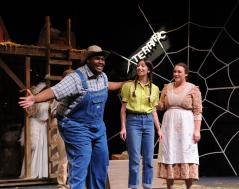In a world where visionaries in most professions are trying to figure out how to do more with less, the School of Theatre is tapping into one of its most valuable resources – the students – to help underclassmen understand the level of commitment necessary for a successful collegiate career.
The School of Theatre has initiated a peer mentoring program in which junior and senior theatre majors are guiding freshmen and new students – appropriately called “understudies”– through what can be an overwhelming immersion in university-level dramatic arts.
“SFA School of Theatre is a lot of theatre really fast, which is great, but it is also very intimidating for freshmen coming in,” explained CC Conn, assistant professor of lighting and sound design at SFA. “Freshmen are intimidated by faculty, so we’re trying to give them a junior or senior student who will help them – someone they can talk to.”
Conn attended a mentoring conference at the University of New Mexico in fall 2012 where speakers described a variety of mentoring approaches, including formal, informal and group programs.
“The ones that kept piquing my interest were the ones on peer mentoring,” she said. “We’re a small faculty, and while we all try to help students as much as we can, I liked the idea of using our older students to reach out to our younger students.”
The conference led to a pilot mentoring program at SFA in spring 2013 when about 20 interested freshmen were divided among three upperclassmen mentors. That experience led to what is now a full-blown School of Theatre mentoring program funded in part through a mini-grant from SFA Provost Dr. Richard Berry.
Standards for participating were developed. Mentors must maintain a 3.2 GPA and must have a designated number of theatre credit hours. They also must submit an essay outlining their reasons for wanting to become mentors.
“You have to really know SFA theatre to successfully be a mentor,” Conn said.
She received 24 applications for mentors, and 19 were accepted for this academic year. Steen Library provided them with theatre-specific library resources and information about the Academic Assistance and Resource Center, and a career coach talked to them about coaching others. SFA Counseling Services trained the mentors in suicide prevention. Effective communication skills also were addressed in the training.
Conn returned to the New Mexico mentoring conference last fall and gave a presentation on the SFA program. Participating understudies are
giving the program rave reviews.
“My mentor has helped me gain a lot of confidence,” said freshman Sydney Whigam of Sugar Land. “I can go to him for help with auditions or classes.”
Nicole Novit came to SFA as a sophomore transfer student and said she felt “lost” in those first few weeks on campus. Life for theatre students moves quickly, with auditions on the first day of class. The mentoring program helps clear up some of the confusion, she said.
“I think it is really helpful that we have mentoring meetings before classes start, where all of the new freshmen and transfers get to meet each other,” said Novit, a junior from Dallas. “That helps them become friends, and it also helps an entire board of really involved upperclassmen mentors get to know them.”
As a theatre student seeking teacher certification, Novit said she finds the mentoring program especially useful.
“Learning how to mentor is a helpful skill, especially for anyone who wants to work in educational theatre,” she said.
Conn hopes that the program will give SFA School of Theatre a recruiting edge when prospective students learn they will have a mentor to help them navigate the complexities of college life. She also hopes the program has even farther-reaching effects.
“We teach information, and we train our students on the technique and the art of theatre, but there’s got to be something about a university training them to be good people,” she said. “If they find themselves in a situation where they are encouraging or teaching someone, in a lot of ways, they are encouraging and teaching themselves.
“There are so many different ways we mentor throughout our lives. On the surface, the mentor can list this on his or her resumé. But the important reality of it is that mentoring makes for a stronger person.”




